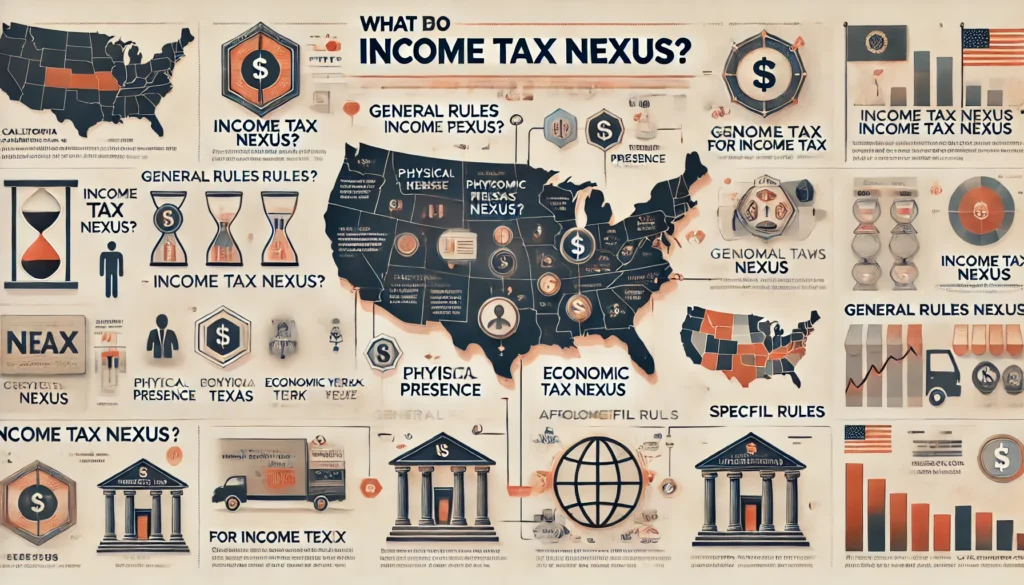Income tax is a critical aspect of fiscal policy and economic regulation. It funds essential public services such as healthcare, education, and infrastructure. The term “nexus” in the context of income tax refers to the connection or link that a state has with a business or individual that obligates them to pay taxes within that state. Understanding the nexus for income tax is crucial for both individuals and businesses to ensure compliance with tax laws and to avoid legal and financial penalties. This blog explores the general rules for income tax nexus, focusing on the overall regulations and specific rules for various states.
What is Income Tax Nexus?
Income tax nexus refers to the degree of connection between a taxpayer and a state that enables the state to impose tax obligations on the taxpayer. Nexus is established through various activities, presence, or economic relationships within the state. This concept is fundamental for states to justify taxing businesses or individuals that benefit from the state’s infrastructure and services.
General Rules for Income Tax Nexus
- Physical Presence: Historically, physical presence has been the primary factor in establishing nexus. This includes having an office, warehouse, employees, or property within the state.
- Economic Presence: Many states have adopted an economic presence standard, which establishes nexus based on the amount of business conducted within the state. For example, reaching a certain sales threshold can create nexus even if there is no physical presence.
- Affiliate Nexus: This rule applies when an out-of-state business is affiliated with an in-state entity. If the in-state entity performs services or activities that benefit the out-of-state business, nexus may be established.
- Click-Through Nexus: This involves online sales through affiliates. If a business has affiliates in a state who refer customers through links on their websites, nexus can be established if sales exceed a certain amount.
- Marketplace Facilitator Nexus: States require marketplace facilitators (e.g., Amazon, eBay) to collect and remit sales tax on behalf of third-party sellers. This can also create an income tax nexus.
- Public Law 86-272: This federal law restricts states from imposing a net income tax on businesses whose only activity in the state is soliciting orders for sales of tangible personal property that are approved and fulfilled from outside the state.
Income Tax Nexus Rules for Specific States
California
California has one of the most comprehensive and strict tax regimes in the United States.
- Physical Presence: Any physical presence, such as an office, warehouse, or employees, establishes nexus.
- Economic Presence: California uses a factor presence standard. Nexus is established if any of the following thresholds are met:
- $500,000 in sales
- $50,000 in property
- $50,000 in payroll
- Affiliate Nexus: Nexus is established if an affiliate conducts business activities on behalf of the taxpayer.
- Click-Through Nexus: Sales through California-based affiliates can create nexus if sales exceed $10,000 annually.
Texas
Texas has no personal income tax, but it does impose a franchise tax on businesses.
- Physical Presence: A physical presence in Texas, such as an office, warehouse, or employees, establishes nexus.
- Economic Presence: Businesses with gross receipts from Texas exceeding $1,180,000 are required to file and pay the franchise tax.
- Affiliate Nexus: Affiliate activities that benefit the business can establish nexus.
- Marketplace Facilitator Nexus: Marketplace facilitators must collect and remit sales tax on behalf of third-party sellers.
New York
New York has complex tax regulations and aggressively pursues tax revenue.
- Physical Presence: Any physical presence, including offices, warehouses, or employees, establishes nexus.
- Economic Presence: New York has an economic nexus standard based on sales thresholds. Nexus is established if sales exceed $500,000 and 100 transactions.
- Affiliate Nexus: Affiliate activities that benefit the business can establish nexus.
- Click-Through Nexus: Sales through New York-based affiliates can create nexus if sales exceed $10,000 annually.
Florida
Florida does not impose a personal income tax but has a corporate income tax.
- Physical Presence: Any physical presence, such as an office, warehouse, or employees, establishes nexus.
- Economic Presence: Florida uses a factor presence standard for corporate income tax. Nexus is established if the business has a certain level of property, payroll, or sales in the state.
- Affiliate Nexus: Affiliate activities that benefit the business can establish nexus.
- Marketplace Facilitator Nexus: Marketplace facilitators must collect and remit sales tax on behalf of third-party sellers.
Nearby States: Income Tax Nexus Rules
Arizona
- Physical Presence: Any physical presence, such as an office, warehouse, or employees, establishes nexus.
- Economic Presence: Arizona has adopted an economic presence standard. Nexus is established if a business has gross receipts of $150,000 or more.
- Affiliate Nexus: Affiliate activities that benefit the business can establish nexus.
- Marketplace Facilitator Nexus: Marketplace facilitators must collect and remit sales tax on behalf of third-party sellers.
Nevada
Nevada does not impose a corporate or personal income tax. However, it does have a commerce tax based on gross revenue.
- Physical Presence: A physical presence in Nevada, such as an office, warehouse, or employees, can establish nexus.
- Economic Presence: Nexus is established if a business’s gross revenue exceeds $4 million.
- Affiliate Nexus: Affiliate activities that benefit the business can establish nexus.
- Marketplace Facilitator Nexus: Marketplace facilitators must collect and remit sales tax on behalf of third-party sellers.
Oregon
Oregon imposes a corporate excise tax but no sales tax.
- Physical Presence: Any physical presence, such as an office, warehouse, or employees, establishes nexus.
- Economic Presence: Oregon has adopted an economic presence standard. Nexus is established if the business has $750,000 or more in Oregon sales.
- Affiliate Nexus: Affiliate activities that benefit the business can establish nexus.
- Marketplace Facilitator Nexus: While Oregon does not have a sales tax, the corporate excise tax nexus rules apply.
Conclusion
Navigating the nexus for income tax can be complex due to varying rules and thresholds across states. It is crucial for businesses and individuals to understand these rules to ensure compliance and avoid penalties. States are continually evolving their tax policies to capture revenue from businesses benefiting from their economies, especially in the digital age. Consulting with tax professionals and staying informed about state-specific regulations can help manage and fulfill tax obligations effectively.



